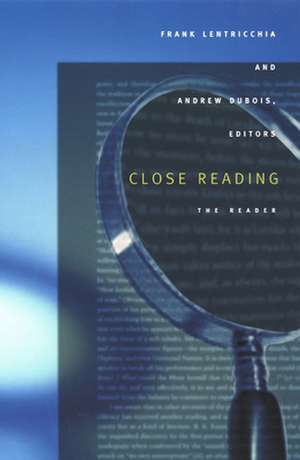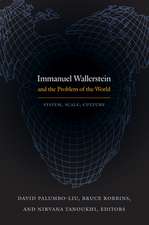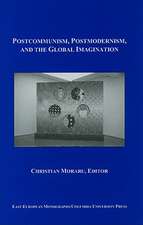Close Reading – The Reader
Autor Frank Lentricchia, Andrew Duboisen Limba Engleză Paperback – 22 dec 2002
Preț: 306.60 lei
Nou
Puncte Express: 460
Preț estimativ în valută:
58.67€ • 61.25$ • 48.55£
58.67€ • 61.25$ • 48.55£
Carte tipărită la comandă
Livrare economică 05-19 aprilie
Preluare comenzi: 021 569.72.76
Specificații
ISBN-13: 9780822330394
ISBN-10: 0822330393
Pagini: 408
Ilustrații: 1 figure
Dimensiuni: 152 x 229 x 22 mm
Greutate: 0.63 kg
Ediția:New.
Editura: MD – Duke University Press
Locul publicării:United States
ISBN-10: 0822330393
Pagini: 408
Ilustrații: 1 figure
Dimensiuni: 152 x 229 x 22 mm
Greutate: 0.63 kg
Ediția:New.
Editura: MD – Duke University Press
Locul publicării:United States
Recenzii
"This scintillating book shows that the alleged death of close reading at the hands of theory and the turn away from literary works themselves have been greatly exaggerated." -Gerald Graff, University of Illinois, Chicago"A history, a tool for teaching, a work of learned analysis, this book mediates importantly for a divided discipline, between 'formalists' and those who do 'cultural studies.' 'Close reading,' it shows, necessarily connects all serious criticism, and its argument becomes the basis for a strong pedagogy and for disciplinary rethinking."-George Levine, Rutgers University"Debating close reading means doing it. By displaying the inheritance of the greatest New Critics in many of today's greatest critics, this new anthology revives, renews, and advances the cause of literary studies. Andrew DuBois's long introduction close-reads the close readers with brilliant fidelity, insight, and wit."-Marshall Brown, University of Washington"Close Reading is an extremely valuable instrument of literary pedagogy. It recalls its readers to the ethical responsibilities as well as the aesthetic pleasures which are inextricably intertwined within their individual acts of reading."-Donald E. Pease, Dartmouth College "This is an important anthology that challenges the assumption of a radical break between formalism and the criticism that followed it. Andrew DuBois's fine introductory essay usefully fills out the history of the New Criticism, while forcing a reconsideration of some currently widespread theoretical assumptions. The thoughtfully chosen essays anthologized in Close Reading persuasively demonstrate the continuities between formalist and post-formalist criticism and, at the same time, show students the value of close and critical reading."-Suzy Anger, University of Maryland, Baltimore County"The anthology nevertheless remains suggestive of further possibilities in retrieving aspects of the critical heritage for contemporary concerns."--EUROPEAN JOURNAL OF ENGLISH STUDIES, Vol 8 No. 1, April 2004
"This scintillating book shows that the alleged death of close reading at the hands of theory and the turn away from literary works themselves have been greatly exaggerated." -Gerald Graff, University of Illinois, Chicago "A history, a tool for teaching, a work of learned analysis, this book mediates importantly for a divided discipline, between 'formalists' and those who do 'cultural studies.' 'Close reading,' it shows, necessarily connects all serious criticism, and its argument becomes the basis for a strong pedagogy and for disciplinary rethinking."-George Levine, Rutgers University "Debating close reading means doing it. By displaying the inheritance of the greatest New Critics in many of today's greatest critics, this new anthology revives, renews, and advances the cause of literary studies. Andrew DuBois's long introduction close-reads the close readers with brilliant fidelity, insight, and wit."-Marshall Brown, University of Washington "Close Reading is an extremely valuable instrument of literary pedagogy. It recalls its readers to the ethical responsibilities as well as the aesthetic pleasures which are inextricably intertwined within their individual acts of reading."-Donald E. Pease, Dartmouth College "This is an important anthology that challenges the assumption of a radical break between formalism and the criticism that followed it. Andrew DuBois's fine introductory essay usefully fills out the history of the New Criticism, while forcing a reconsideration of some currently widespread theoretical assumptions. The thoughtfully chosen essays anthologized in Close Reading persuasively demonstrate the continuities between formalist and post-formalist criticism and, at the same time, show students the value of close and critical reading."-Suzy Anger, University of Maryland, Baltimore County "The anthology nevertheless remains suggestive of further possibilities in retrieving aspects of the critical heritage for contemporary concerns."--EUROPEAN JOURNAL OF ENGLISH STUDIES, Vol 8 No. 1, April 2004
"This scintillating book shows that the alleged death of close reading at the hands of theory and the turn away from literary works themselves have been greatly exaggerated." -Gerald Graff, University of Illinois, Chicago "A history, a tool for teaching, a work of learned analysis, this book mediates importantly for a divided discipline, between 'formalists' and those who do 'cultural studies.' 'Close reading,' it shows, necessarily connects all serious criticism, and its argument becomes the basis for a strong pedagogy and for disciplinary rethinking."-George Levine, Rutgers University "Debating close reading means doing it. By displaying the inheritance of the greatest New Critics in many of today's greatest critics, this new anthology revives, renews, and advances the cause of literary studies. Andrew DuBois's long introduction close-reads the close readers with brilliant fidelity, insight, and wit."-Marshall Brown, University of Washington "Close Reading is an extremely valuable instrument of literary pedagogy. It recalls its readers to the ethical responsibilities as well as the aesthetic pleasures which are inextricably intertwined within their individual acts of reading."-Donald E. Pease, Dartmouth College "This is an important anthology that challenges the assumption of a radical break between formalism and the criticism that followed it. Andrew DuBois's fine introductory essay usefully fills out the history of the New Criticism, while forcing a reconsideration of some currently widespread theoretical assumptions. The thoughtfully chosen essays anthologized in Close Reading persuasively demonstrate the continuities between formalist and post-formalist criticism and, at the same time, show students the value of close and critical reading."-Suzy Anger, University of Maryland, Baltimore County "The anthology nevertheless remains suggestive of further possibilities in retrieving aspects of the critical heritage for contemporary concerns."--EUROPEAN JOURNAL OF ENGLISH STUDIES, Vol 8 No. 1, April 2004
Notă biografică
Frank Lentricchia is Katherine Everett Gilbert Professor of Literature at Duke University and author of numerous books including After the New Criticism, Ariel and the Police, and Modernist Quartet. His novel Lucchesi and The Whale and his collection Introducing Don DeLillo are published by Duke University Press. Andrew DuBois is a doctoral candidate in the Department of English and American Language and Literature at Harvard University.
Andrew DuBois is a doctoral candidate in the Department of English and American Language and Literature at Harvard University.
Textul de pe ultima copertă
"This is an important anthology that challenges the assumption of a radical break between formalism and the criticism that followed it. Andrew DuBois's fine introductory essay usefully fills out the history of the New Criticism, while forcing a reconsideration of some currently widespread theoretical assumptions. The thoughtfully chosen essays anthologized in "Close Reading" persuasively demonstrate the continuities between formalist and post-formalist criticism and, at the same time, show students the value of close and critical reading."--Suzy Anger, University of Maryland, Baltimore County
Cuprins
Preface ix
Introduction / Andrew DuBois 1
I. Formalism (Plus)
Poetry: A Note on Ontology / John Crowe Ransom 43
Keats’s Sylvan Historian: History Without Footnotes / Cleanth Brooks 61
Symbolic Action in a Poem by Keats / Kenneth Burke 72
The Ekphrastic Principle and the Still Movement of Poetry; or Laokoon Revisited / Murray Krieger 88
Examples of Wallace Stevens / R. P. Blackmur 111
How to Do Things with Wallace Stevens / Frank Lentricchia 136
Stevens and Keats’s “To Autumn” / Helen Vendler 156
“Lycidas”: A Poem Finally Anonymous / Stanley Fish 175
After Formalism?
Literary History and Literary Modernity / Paul de Man 197
Acts of Cultural Criticism / Roland Barthes 216
Nostalgia for the Present / Fredric Jameson 226
The Mousetrap / Catherine Gallagher and Stephen Greenblatt 243
Jane Austen’s Cover Story (And Its Secret Agents) / Sandra Gilbert and Susan Gubar 272
Jane Austen and the Masturbating Girl / Eve Kosofsky Sedgwick 301
Ulysses and the Twentieth Century / Franco Maretti 321
To Move Without Moving: An Analysis of Creativity and Commerce in Ralph Ellison’s Trueblood Episode / Houston A. Baker Jr. 337
The World and the Home / Homi K. Bhabhi 366
Contributors 381
Acknowledgment of Copyrights 385
Index 387
Introduction / Andrew DuBois 1
I. Formalism (Plus)
Poetry: A Note on Ontology / John Crowe Ransom 43
Keats’s Sylvan Historian: History Without Footnotes / Cleanth Brooks 61
Symbolic Action in a Poem by Keats / Kenneth Burke 72
The Ekphrastic Principle and the Still Movement of Poetry; or Laokoon Revisited / Murray Krieger 88
Examples of Wallace Stevens / R. P. Blackmur 111
How to Do Things with Wallace Stevens / Frank Lentricchia 136
Stevens and Keats’s “To Autumn” / Helen Vendler 156
“Lycidas”: A Poem Finally Anonymous / Stanley Fish 175
After Formalism?
Literary History and Literary Modernity / Paul de Man 197
Acts of Cultural Criticism / Roland Barthes 216
Nostalgia for the Present / Fredric Jameson 226
The Mousetrap / Catherine Gallagher and Stephen Greenblatt 243
Jane Austen’s Cover Story (And Its Secret Agents) / Sandra Gilbert and Susan Gubar 272
Jane Austen and the Masturbating Girl / Eve Kosofsky Sedgwick 301
Ulysses and the Twentieth Century / Franco Maretti 321
To Move Without Moving: An Analysis of Creativity and Commerce in Ralph Ellison’s Trueblood Episode / Houston A. Baker Jr. 337
The World and the Home / Homi K. Bhabhi 366
Contributors 381
Acknowledgment of Copyrights 385
Index 387
Descriere
A reader intended for courses, presenting the continuity of close reading from New Criticism through poststructuralism






















